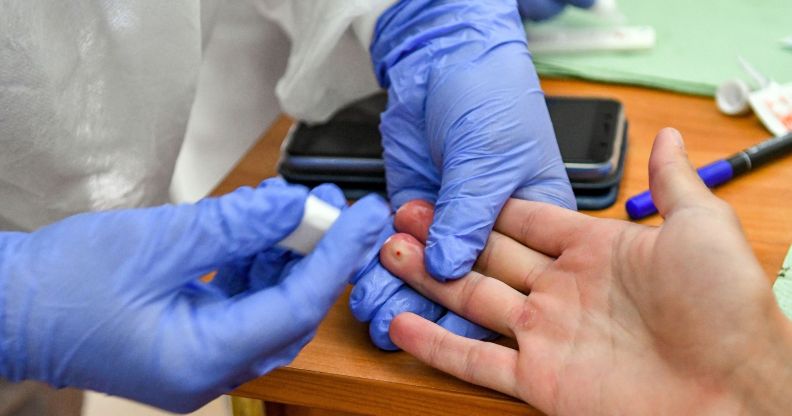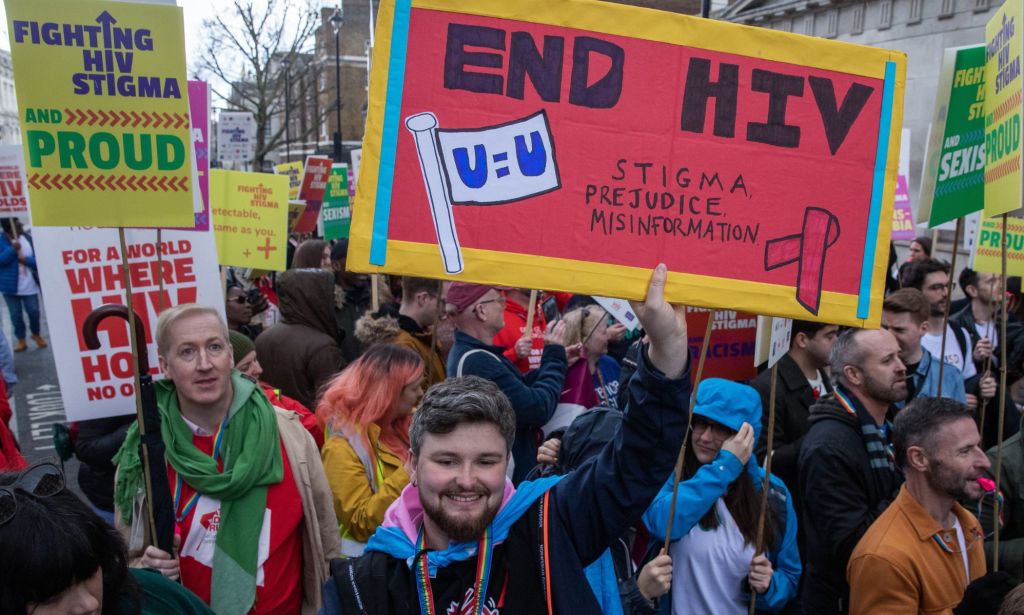‘Life-changing’ HIV testing scheme in hospitals finds hundreds of new diagnoses

Expanding the opt-out program could have incredibly effective results, UK charities have said. (Getty)
UK charities are urging the government to expand opt-out HIV testing after a one-year trial saw almost 2,000 new diagnoses.
Experts are calling the expansion of the testing initiative a “no-brainer” after NHS England released results from their clinical trial earlier today (7 June).
The trial, which began last year, saw emergency departments in London, Manchester and Brighton test all A&E patients who had blood drawn, unless they chose to opt out.
According to the published reports, the trials have been hugely effective, identifying 1,998 cases of HIV, hepatitis B and hepatitis C in just 12 months.
It also helped 470 people, who were previously diagnosed, access life-changing treatment to help tackle the condition.
Not only has the trial proved the effectiveness of the strategy, but it has also reportedly saved the NHS millions thanks to early diagnoses preventing the need for emergency care.
Additionally, it will help identify HIV transmission in lower-priority groups or those who have never been to a sexual-health clinic.

The results have prompted healthcare professionals, as well as charities associated with the project, such as the Terrence Higgins Trust, the National Aids Trust and the Elton John Aids Foundation, to recommend that the government expand the trial further.
In February, public health minister Neil O’Brien signalled a consideration to expand the system to the next 32 areas with the highest HIV prevalence in the country, at an estimated cost of least £18 million.
Several charities, MPs and council leaders have now urged O’Brien to push ahead.
“The expansion of A&E HIV and hepatitis testing is essential to reaching our life-changing goal of ending new HIV cases by 2030,” Terrence Higgins Trust chief executive Richard Angell said.
“The results from one year of opt-out testing in areas with very high HIV prevalence are above and beyond what anyone expected and have demonstrated an incredible return to investment.
“Every day that passes, we miss opportunities to find more people with HIV, hepatitis B and hepatitis C across England and ensure they are accessing the care they need.”
Anne Aslett, chief executive of the Elton John Aids Foundation, said that “staggering” results during a trial test in south London proved that the scheme was incredibly effective.
“Since opt-out testing in the highest prevalence areas began last April, the system has diagnosed people from the ages of 18 to 85,” she continued. “It has been incredible to see how opt-out testing has changed the lives of people living with HIV.
“No more delays – we need to ensure that opt-out HIV and hepatitis testing is standard practice in this country.”
HIV Action Plan pledges to eliminate the virus by 2030
Several recommendations were made in the House of Lords in March, including the implementation of opt-out testing, as part of the government’s HIV Action Plan.
Announced in 2021, the scheme aims to reduce new yearly cases to 600 by 2025 and to completely eradicate the transmission of the condition by 2030.
A bipartisan group of lords called on the government to enact recommendations that would help reach the goal on time.
As well as implementing opt-out testing, the group recommended new government schemes to combat the stigma faced by those living with HIV.
In response, Lord Evans of Rainow said it was an “excellent idea” and that he would refer it back to relevant officials.
Referring to opt-out testing, he said experts would be “considering the full evidence” of the first year’s trial results before considering further implementation.
According to Deborah Gold, the chief executive of the National Aids Trust, there are believed to be at least 4,400 people living with undiagnosed HIV across England.
She said that, considering the effectiveness of the trial, the initiative could be “vital” in reaching the 2030 goal.
“The programme is also finding people living with HIV from groups who are less likely to test anywhere else, including women, heterosexuals and those of Black ethnicities,” Gold continued. “Now they can receive the care they need and can expect improved health outcomes, while preventing the onward transmission of the virus.“

